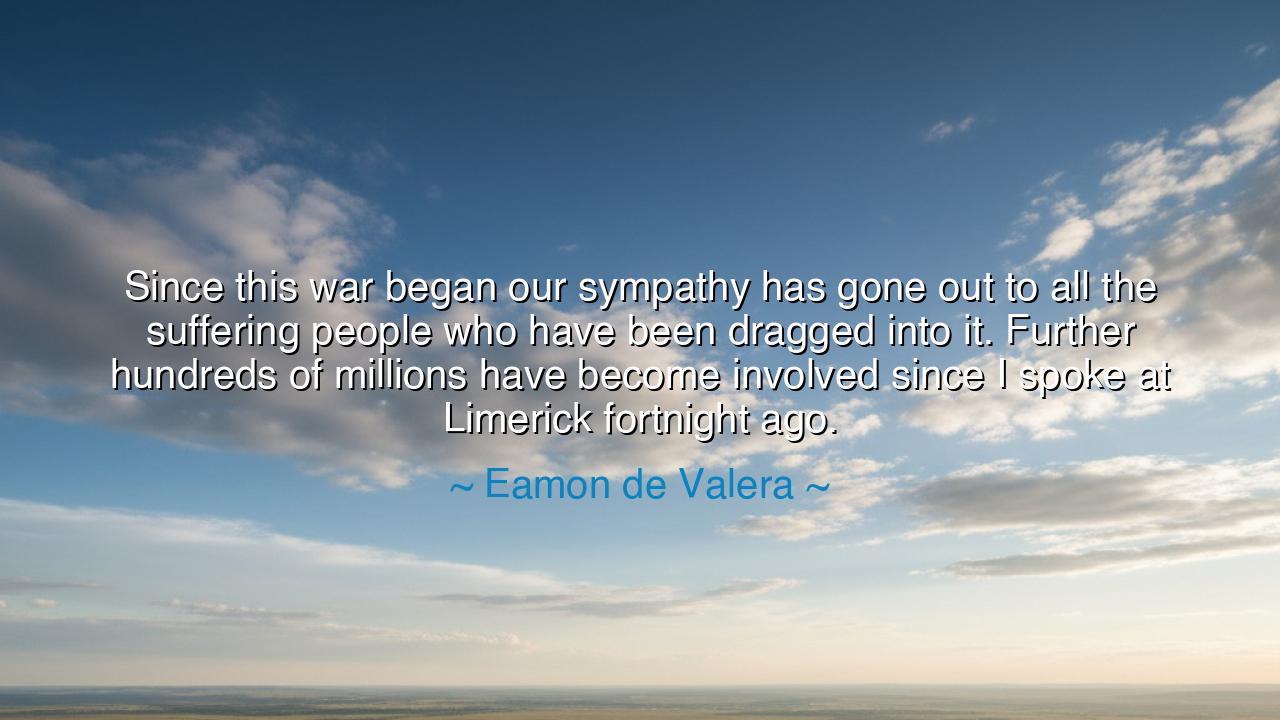
Since this war began our sympathy has gone out to all the
Since this war began our sympathy has gone out to all the suffering people who have been dragged into it. Further hundreds of millions have become involved since I spoke at Limerick fortnight ago.






"Since this war began our sympathy has gone out to all the suffering people who have been dragged into it. Further hundreds of millions have become involved since I spoke at Limerick fortnight ago." These words by Eamon de Valera, spoken during a tumultuous time in history, reflect the deep human empathy that arises in the face of global conflict. De Valera’s speech, delivered during the height of the Irish War of Independence, recognizes not only the suffering of those directly involved in the war but also the far-reaching effects that such a conflict can have on people across the world. The magnitude of the suffering, he acknowledges, is not confined to any single nation or group; instead, it ripples out, drawing in the innocent and vulnerable from every corner of the globe.
De Valera’s reference to the "suffering people" reveals the universal nature of human compassion in times of conflict. As the war escalates, and the ripples spread far and wide, his sympathy is extended to all those caught in the crossfire, whether they are soldiers on the front lines or civilians who have been forced into a world of violence and loss. This compassion is not limited by nationality or race, but is a call to the shared humanity of all people. It is a reminder that war, in its most brutal form, does not discriminate—it ensnares all, regardless of their affiliations or innocence.
Consider the great wars of the 20th century, which caused immeasurable suffering not just for soldiers, but for millions of civilians. The World Wars, in particular, are prime examples of the far-reaching effects of conflict. The horrors of World War II, with its mass destruction, forced migration, and genocide, serve as an enduring testament to how global wars do not merely involve those fighting on the battlefield—they devastate the lives of countless innocents, creating a chain of suffering that echoes through time. De Valera’s speech acknowledges this enduring truth: that the victims of war are not just the combatants but the people who, through no fault of their own, are swept into its destructive current.
In this statement, De Valera also reflects a profound understanding of the interconnectedness of the world. The war he speaks of may have begun as a localized conflict, but as time passes, it draws in more and more nations, affecting hundreds of millions. This mirrors the expansion of conflict throughout history—how a war, even one that begins in a small corner of the globe, can escalate into something that engulfs entire continents. The Spanish Civil War, for example, though primarily a struggle within Spain, became a battleground for ideological forces from around the world, drawing in Germany, Italy, the Soviet Union, and volunteers from various countries. The ripple effect of one nation’s strife is often felt globally, and De Valera’s words speak to the awareness of this painful truth.
The lesson in De Valera’s words is that compassion is not limited by boundaries—it is a universal quality that must be extended to all who suffer, no matter where they are or what side they are on. True sympathy comes not from partisan allegiance but from a recognition of the shared humanity of all people. War may be a reality of human history, but the compassion we show to one another in its wake can help rebuild what has been shattered. De Valera’s words call upon each of us to look beyond our own nation’s interests and to see the suffering of others as our own, to extend our sympathy to all who are affected by the violence and destruction of war.
In our own time, this lesson remains as relevant as ever. The conflicts that rage across the world today—whether in Syria, Yemen, or Ukraine—affect not just the people involved, but the global community. As citizens of the world, we must extend our compassion to those who suffer, and recognize that their pain is a reflection of our shared humanity. We cannot afford to turn a blind eye to the suffering of others simply because they are far from our borders or because their struggles do not directly impact our own lives. The compassion De Valera spoke of must move us to action, whether through advocacy, humanitarian aid, or simply a deeper commitment to understanding the plight of others.
The practical action we can take, then, is to engage in global solidarity—to look beyond national boundaries and see the human beings who suffer from the ravages of war. This is a call not just for political action but for personal commitment to the values of empathy, justice, and peace. As individuals, we can support organizations that work to alleviate suffering, educate ourselves about the crises around the world, and stand in solidarity with those who are suffering, whether in conflict zones or refugee camps. Our collective effort can contribute to a more compassionate and just world, one where the ripple effects of war are met with hope, healing, and unity.
Thus, De Valera’s words remind us that sympathy is a powerful tool—one that can transcend borders, time, and conflict, and become the foundation upon which we build a more humane and peaceful world.






AAdministratorAdministrator
Welcome, honored guests. Please leave a comment, we will respond soon